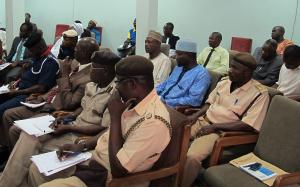Discussion
Details
Stakeholders in the security sector that attended include the Department of State Security, representative of the Commissioner of Police in Oyo State, NSCDC representative of the General Commanding Officer (GOC) 2 Mechanized Division, the vigilante chairman in Oyo State, the neighborhood watch, Peace Corps, and some local NGOs and many others.
The rationale for this roundtable is the level of insecurity in the country and Prof. Tajudeen Akanji introduced the stakeholders to the roundtable by presenting a paper on ‘The Roles of the Security Sector in the Promotion of Democratic Governance in Nigeria’. He examined the roles that the security sector has played since 1999 in the sustenance of positive democratic governance in Nigeria. He pointed out that insecurity is a major threat to democracy, and this should be avoided at all cost.
Prof. Bayo Okunade on his part delivered a paper on ‘Constitutionalism, State Making and Security Crises in Nigeria – A Review’; where he first defined national security, and then went on to define what constitutionalism is. He concluded the definition of constitutionalism as the compliance with the letter and the spirit of the Constitution of a nation, and state making as the construction of the state with necessary cohesion required for making authoritative and binding decision in performing its functions. He highlighted how insecurity like kidnapping has gone up in Nigeria, and the country has been listed as one with the higher rates of kidnapping in the world. Insecurity as oil theft, bunkering, pipeline vandalism, piracy and even militancy not only threaten the national security, but also the Nigeria’s economic security. With the coming of Boko Haram, comes the biggest threat to the corporate existence of the nation.
While presenting his own paper on ‘Inter Agencies Approach to Security Management in Nigeria: Prospects and Problems’, Prof. Isaac Olawale Albert identified the security agencies in Nigeria to be the armed forces, the Para-military organizations, and private security organizations. The agencies collaborate to promote active working relationship among them with a view to improve process outcomes at a reduced cost, and at a faster rate. The peculiarity about such collaboration is the occasional crossing of the boundaries of other agencies mandates. He gave the examples of existing inter agency security structures already available in Nigeria as the National Security Council; State Security Council in every state; Local Government security Council; Task Forces (Niger Delta, Jos, Crime Prevention Task Forces); and finally the civil society organizations. He pointed out as major hindrance the issue of funding for these collaborations, and also the inadequate knowledge about the processes and cultures of other agencies, which has brought many conflicts in such collaborations in the past. He suggested security sector reform that supports collaboration among agencies. Also joint trainings and workshops will bring the agencies together, and make them function better in future.
Dr. R. Olaniyi spoke on ‘An Analysis of Community Involvement in Security Management in a Federal State – The Case of Nigeria’, while Prof. Omotoye Olorode delivered his paper on ‘Security Crises: Implications for National Integration and Development’.
A panel discussion led by Prof. Segun Ajiboye and Prof. Soji Aremu put all the perspectives discussed in the papers under scrutiny, and motivated the participants to contribute to the discussion. A very lively discussion with the participants followed and KAS was asked to provide an opportunity for such a discussion and exchange of ideas for the betterment of the Security Sector regularly.




